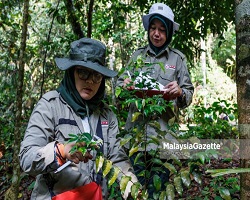Entrepreneurs are the main drivers in economic growth with them introducing innovative technologies for development of new products and services to meet the demand and offering new job opportunities. The roles of entrepreneurship in the context of the 2030 Agenda for Sustainable Development have expanded not only to raise the productivity of firms and economies but also to create profitable businesses that promote sustainable development. This brings to a new concept of “Ecopreneurship”, a term that is coined to represent the process of principles of entrepreneurship being applied to create businesses that operate sustainably based on three pillars, that are innovation, caring for the environment, and long-term sustainability. Ecopreneurship has the potential to be a major force in the overall transition from entrepreneurship to a more sustainable business with its threefold advantages; towards the environment, society and future generation.
The environment has always been a fundamental issue when it comes to economic growth, being said, commercial and industrial activities are accelerating environmental degradation evidenced by the occurrences of environmental disasters that includes an endless list of pollution, rise in temperature, flash flood, landslide and many more to enlist. Ecopreneurship, at its best, is promoting an environmentally-friendly business model with its goal to be non-hazard towards the environment. The most popular approach is circularity of resources that promotes lengthening lifecycle of products. This concept is originally coming from the 3R’s (reuse, reduce, recycle) to reduce the amount of waste for final disposal in landfills. Acknowledged with the efficacy of the 3R’s towards environmental protection, why not to put it on a larger scale by applying the concept in the industrial activities. One of the most prominent examples of industry promoting circularity of resources is a Sweden household company, IKEA that actively recycles their products and reuses resources for production.
With circularity in resources for production, this will encourage more job creations with broader scope of skills from entry-level until professional positions. In most countries, micro, small and medium sized enterprises (MSMEs) are a key part of the national development policies as important facilitators for national inclusive development. By implementing the ecopreneurship concept, MSMEs will be offering more job openings from the entry level. This will eradicate poverty and reduce inequality for the majority of the population by including disadvantaged groups. This will take up the challenge set in the Sustainable Development Goal (SDG) target 8 of creating 600 million new jobs by 2030, including all ages, gender and abilities for equal pay for work of equal value. As a whole, this will contribute to building resilient organizations, promoting inclusive and sustainable industrialization.
However, adapting ecopreneurship in developing countries and countries with economies in transition have no exception to face challenges such as lack of competitiveness, unreliable resources and inadequate financing. This will limit their engagement in productive activities and contribution to inclusive development. Governments therefore have an important role in creating an enabling environment for the development of ecopreneurship to align with the 2030 Agenda. For that matter, governments should embrace to improve their institutional support for a wide spectrum of ecopreneurial activities by sharing information with responsible business toward identifying good practices in enhancing contributions to sustainable and inclusive development. To solve the lack of competitiveness, ecopreneurs should be set as good examples and granted extra positive affective rewards, because naturally moral satisfaction encourages individuals to engage more and induce competitiveness. Governments also should offer fiscal subsidies to green products, with this, it means the product is a part of the circularity of resources, to reduce the price gap with traditional goods. To conclude in a sentence, ecopreneurship is a mutual responsibility among business stakeholders in working towards the SDGs and sustainable development, to make certain that our future generation has the right to achieve a sustainable level of development and the right to be able to utilize natural resources.
Date of Input: 29/09/2022 | Updated: 29/09/2022 | masridien
MEDIA SHARING




























